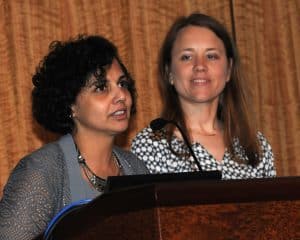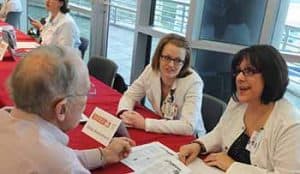Geriatrics Conference Features Lawyers, Nurse Practitioners, Physicians

Priya Mendiratta, M.D., M.P.H., left, and Amy Pritchard, J.D., address the audience at the geriatrics update and conference and discuss medical-legal working partnerships.
| Oct. 13, 2015 | Joyce Tailford knew it was time to update her will but just hadn’t gotten around to scheduling it. That was solved for her when she was able to take advantage of free legal advice Sept. 24 at a UAMS conference on geriatrics.
The Geriatrics and Long-Term Care Update organized by the UAMS Donald W. Reynolds Institute on Aging included a session offering free help to seniors needing to prepare basic legal documents, such as a will or living will.
“It’s been informative as well as quick and easy,” said Joyce Tailford, who got her will revised. “I wanted to update my will, and now I have that done. A lot of people my age have wills but need to make them current and haven’t.”
This is the first time in its 16-year history that the conference offered legal help and health screenings for seniors.
About 270 people attended the conference Sept. 23-27 held at the UAMS Jackson T. Stephens Spine & Neurosciences Institute. On Sept. 24, several volunteer attorneys, coordinated with the assistance of the Center for Arkansas Legal Services, provided free help to 32 seniors.
The Geriatrics and Long-Term Care Update was begun by Jeanne Wei, M.D., Ph.D., director of the Reynolds Institute on Aging, to provide the latest information to physicians and other health professionals, as well as caregivers to the aging population.

UAMS physicians and nurse practitioners hold and display a sign announcing free health screenings available to seniors at the conference.
“It was a wonderful addition to have the participation for the first time of the legal community in this year’s update,” said Wei. “The volunteer attorneys added even more to the value and relevance of the conference, which after 16 years has a well-established reputation for communicating the latest findings and best practices in geriatrics.”
Fifty seniors also took advantage of the opportunity to receive free health screenings.
“We were able to provide helpful information to people taking part in the screenings,” said Dawn Hurt, adult-gerontology primary care nurse practitioner student in the UAMS College of Nursing “Many older people don’t get screened for depression because they think that’s a normal part of aging. It’s not. We have been able to provide relevant pointers and tell them about things they didn’t even know.”
The health screenings needed no registration and included screenings for cognition deficits, depression, blood pressure, vision, hearing as well as assessments of sleep health, nutrition health and basic function measures. Fourteen students from College of Nursing students contributed to the interprofessional program by providing screenings, teaching, support and health resources for seniors while they were waiting to see an attorney.
A general introduction of medical-legal issues and why it’s important to have conversations across the medical/legal divide was presented by Priya Mendiratta, M.D., M.P.H., associate professor in the UAMS College of Medicine Department of Geriatrics, and Amy Pritchard, J.D., visiting assistant clinical professor at the University of Arkansas at Little Rock Bowen School of Law.
“There have been very few studies on the medical-nursing-legal partnership,” Mendiratta said. “I think it is worth getting together as a team to help our patients. That would be best for everyone.”
Many seniors and their families face a diversity of legal challenges as they age including: estate planning, access to benefits, legal and mental competency, abuse and neglect.
Pritchard said medical professionals and lawyers working together can help seniors in three principal ways:
- Direct legal care assistance in which an attorney represents or advises a patient.
- Medical and legal institution transformation where attorneys and doctors talk together about barriers to care like utility shutoff and billing issues. Working together for policy change in the statutory and regulatory arenas.
Speakers, presentations and expert panels at the four-day conference covered a wide range of topics in geriatrics from nutrition and diet, infectious diseases, dementia and delirium to stroke management and drug abuse.

